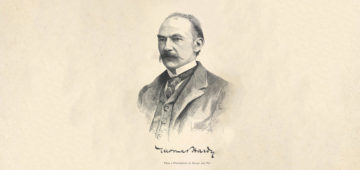Alexander Harris in The Guardian:
 When Thomas Hardy’s wife Emma died in 1912 she left behind the recollections she had been writing of her life in Cornwall before her marriage, evoking her joy as a young woman riding over the cliffs of Beeny and St Juliot. She also left the many diaries she had kept through two decades of increasing alienation from a husband who seemed to have abandoned her for the separate reality of his novels. The bereaved Thomas confronted these documents in shock, encountering in their pages both the young woman he had loved and a horrifying picture of their failed marriage. From the unexpected depths of his grief and remorse came his great sequence of elegies, Poems of 1912-13.
When Thomas Hardy’s wife Emma died in 1912 she left behind the recollections she had been writing of her life in Cornwall before her marriage, evoking her joy as a young woman riding over the cliffs of Beeny and St Juliot. She also left the many diaries she had kept through two decades of increasing alienation from a husband who seemed to have abandoned her for the separate reality of his novels. The bereaved Thomas confronted these documents in shock, encountering in their pages both the young woman he had loved and a horrifying picture of their failed marriage. From the unexpected depths of his grief and remorse came his great sequence of elegies, Poems of 1912-13.
With remarkable steadiness and fine judgment, Elizabeth Lowry goes right into the midst of this legendary literary maelstrom and opens a space for fiction. She inhabits the household at Max Gate, the house Hardy built in Dorset, in the days after Emma’s sudden death and before the poems gave lasting shape and voice to the lost woman on the Cornish hills. Was Hardy the jailer of a neglected wife? Was Emma thwarted in her own writing? Why did it all go so wrong – and did the trouble start with Tess of the d’Urbervilles? Slowly and feelingly, the novel pores over questions about the costs of art, refusing to shout out answers, letting many perspectives tell upon each other.
More here.
